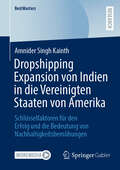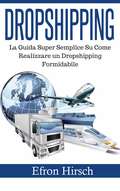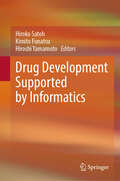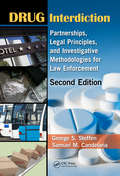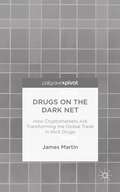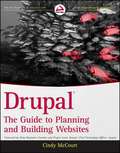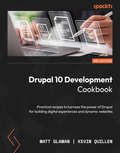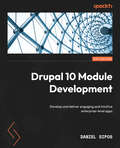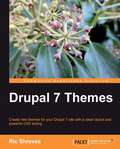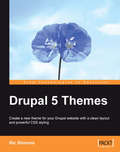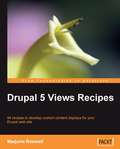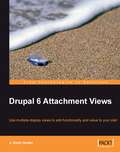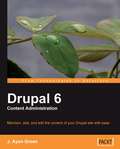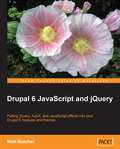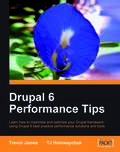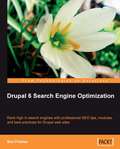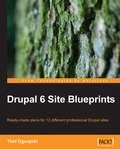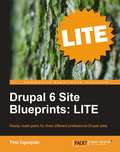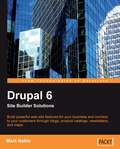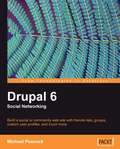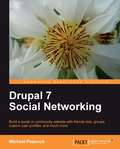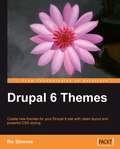- Table View
- List View
Dropped! (Orca Anchor)
by Alice KuipersKey Selling Points A teen competes in a high-stakes internet reality show set on a deserted island, taking it to the extreme to get all eyes on him. The story explores the false reality of lives lived online, and how far people might go for social redemption, popularity, fame and love. The main character struggles with the pressures of social media as he tries to figure out who he really is and what it means to be authentic. This fast-paced story takes place over four days and is told using a mix of short social media posts and a first-person narrative. Enhanced features (dyslexia-friendly font, cream paper, larger trim size) to increase reading accessibility for dyslexic and other striving readers.
Dropshipping Expansion von Indien in die Vereinigten Staaten von Amerika: Schlüsselfaktoren für den Erfolg und die Bedeutung von Nachhaltigkeitsbemühungen (BestMasters)
by Amnider Singh KainthDas vorliegende Buch beschäftigt sich mit den Erfolgsfaktoren für die Expansion von Dropshipping-Unternehmen in neue Märkte und den Auswirkungen von Umweltmaßnahmen auf die Kaufentscheidung und Preisbereitschaft der Kunden. Die Ergebnisse zeigen, dass Anpassungsfähigkeit, Einhaltung von Gesetzen und ein Nischenmarktansatz entscheidend für eine erfolgreiche Expansion sind. Darüber hinaus sind die Kunden, insbesondere Frauen, eher bereit, für umweltfreundlichere Produkte einen Aufpreis zu zahlen, und bevorzugen Unternehmen, die sich für Nachhaltigkeit einsetzen.
Dropshipping: La Guida Super Semplice Su Come Realizzare un Dropshipping Formidabile
by Efron HirschIl dropshipping sta diventando sempre più popolare. Infatti, oggi, molte persone entusiaste del business online lo considerano un approccio semplice e redditizio. Se il dropshipping ti incuriosisce, e il tuo interesse nell’avviare un fiorente business con il dropshipping è ai massimi storici, questo libro ti si rivelerà piuttosto utile. Pensato per essere una guida completa al dropshipping, questo libro ti aiuterà a comprendere la natura del dropshipping e i suoi benefici come modello commerciale di guadagno; questo testo di fornirà tutte le linee guida, semplici da seguire, di cui hai bisogno per avviare il tuo impero di dropshipping. Seguendo le tecniche, i suggerimenti e i trucchi evidenziati in questo libro, non solo sarai in grado di guadagnare i tuoi primi profitti con il dropshipping, ma imparerai anche come ingrandire il tuo business di dropshipping e renderlo di successo.
Dropshipping: La Guía Súper Simple Para Hacer un Dropshipping Ganador
by Andrés Parraud Efron HirschEl Dropshipping se está haciendo cada vez más popular. De hecho, hoy, muchos entusiastas de los negocios en línea consideran que es un sencillo y lucrativo enfoque para un negocio en línea. Si el dropshipping te intriga, y tu interés en comenzar un imperio del dropshipping está en lo más alto, este libro te resultará indudablemente útil. Diseñado para ser la guía completa del dropshipping, este libro te ayudará a comprender la naturaleza del dropshipping y sus beneficios como un modelo de negocio de generación de ingresos, esta guía te proporcionará todas las sencillas pautas que debes seguir para comenzar tu imperio de dropshipping. Siguiendo las técnicas, consejos y trucos delineados en este libro, no sólo podrás obtener tus primeras ganancias en dropshipping, sino que también aprenderás cómo escalar tu negocio de dropshipping y hacerlo exitoso.
Drug Development Supported by Informatics
by Hiroko SatohThis book describes the state-of-the-art of chemoinformatics, bioinformatics, materials informatics and measurement/metrology informatics to develop drugs with desired activity or physicochemical properties and to optimize the functionality, efficacy, safety and quality of the compounds for drugs. Recently, "AI drug discovery", drug discovery research utilizing artificial intelligence technology such as machine learning, has attracted much attention. This book provides an overview of the four applied informatics fields and their applications in drug development for a wide spectrum of readers from learners to professional scientists in academia and industry. It focuses on the basic research stage of drug development with contributions from experts at the forefront of these fields. The authors hope that this book will be of assistance to explore new opportunities for collaboration between pharmaceutical science and informatics.
Drug Interdiction: Partnerships, Legal Principles, and Investigative Methodologies for Law Enforcement, Second Edition
by George S. Steffen Samuel M. CandelariaAs drug trafficking and the abuse of illicit drugs continue to inflict untold harm upon our society, it is clear that a global initiative and an intense domestic strategy are vital to address the sophisticated drug trafficking organizations (DTOs) that are prevalent in many regions. Covering a wide array of domestic interdiction topics, Drug Interd
Drugs on the Dark Net: How Cryptomarkets Are Transforming the Global Trade in Illicit Drugs
by James MartinThis study explores the rapidly expanding world of online illicit drug trading. Since the fall of the infamous Silk Road, a new generation of cryptomarkets can be found thriving on the dark net. Martin explores how these websites defy powerful law enforcement agencies and represent the new digital front in the 'war on drugs'.
Drupal
by Cindy MccourtA complete lifecycle guide to planning and building a site with DrupalDrupal allows you to quickly and easily build a wide variety of web sites, from very simple blog sites to extremely complex sites that integrate with other systems. In order to maximize what Drupal can do for you, you need to plan. Whether you are building with Drupal 6 or 7, this book details the steps necessary to plan your site so you can make informed decisions before you start to build.Explains how to define the scope of your projectShows you how to create a design plan taking into consideration how Drupal worksHelps you make informed decisions regarding development methodologies, environments, standards, and site securityReviews ways to assess the use of existing and/or custom Drupal modulesTeaches you how to avoid common pitfalls that can impact a successful site launchWalks you through preparing for post-launch site maintenance and management tasksDetails incorporating the nature of open source systems into your management strategiesIdentifies ways to interact with members of the Drupal communityThe processes and techniques provided in this book will empower you to create a successful and sustainable site with Drupal.
Drupal 10 Development Cookbook: Practical recipes to harness the power of Drupal for building digital experiences and dynamic websites, 3rd Edition
by Matt Glaman Kevin QuillenBuild your expertise in developing dynamic web experiences by leveraging all-new capabilities of Drupal 10Purchase of the print or Kindle book includes a free PDF eBookKey FeaturesDesign your digital experience platform with robust content management and editorial workflowsWrite custom modules to extend Drupal to meet your requirements by creating customized plugins, entity types, and pagesEnhance your Drupal site using modern frontend development build toolsBook DescriptionThis new and improved third edition cookbook is packed with the latest Drupal 10 features such as a new, flexible default frontend theme - Olivero, and improved administrative experience with a new theme - Claro. This comprehensive recipe book provides updated content on the WYSIWYG (What You See Is What You Get) editing experience, improved core code performance, and code cleanup.Drupal 10 Development Cookbook begins by helping you create and manage a Drupal site. Next, you'll get acquainted with configuring the content structure and editing content. You'll also get to grips with all new updates of this edition, such as creating custom pages, accessing and working with entities, running and writing tests with Drupal, migrating external data into Drupal, and turning Drupal into an API platform. As you advance, you'll learn how to customize Drupal's features with out-of-the-box modules, contribute extensions, and write custom code to extend Drupal.By the end of this book, you'll be able to create and manage Drupal sites, customize them to your requirements, and build custom code to deliver your projects.What you will learnCreate and manage a Drupal site's codebaseDesign tailored content creator experiencesLeverage Drupal by creating customized pages and pluginsTurn Drupal into an API platform for exposing content to consumersImport data into Drupal using the data migration APIsAdvance your Drupal site with modern frontend tools using Laravel MixWho this book is forIf you are a beginner or an intermediate Drupal developer, looking to jumpstart your journey in application building, then this book is for you. Basic knowledge of web development is required.
Drupal 10 Module Development: Develop and deliver engaging and intuitive enterprise-level apps, 4th Edition
by Daniel SiposBuild and customize powerful Drupal modules to extend your website's functionalities with this comprehensive guidePurchase of the print or Kindle book includes a free PDF eBookKey FeaturesExplore the new features and improved capabilities of Drupal 10 coreDiscover Drupal APIs and elevate your proficiency by leveraging PHP codingImplement efficient data management and data security by creating dedicated modulesBook DescriptionEmbark on a journey of Drupal module development with the latest edition of this must-have guide written by Daniel Sipos – a Drupal community member! This fourth edition is meticulously revised to cover the latest Drupal 10 enhancements that will help you build custom Drupal modules with an understanding of code deprecations, changing architecture, data modeling, multilingual ecosystem, and so on.You'll begin with understanding the core components of Drupal 10 architecture, discovering its subsystems and unlocking the secrets of creating your first Drupal module. Further, you'll delve into Drupal logging and mailing systems, creating theme hooks, and rendering a layout. As you progress, you'll work with different types of data storage, custom entities, field types, and work with Database APIs for lower-level database queries. You'll learn to reap the power of JavaScript and ensure that your code works seamlessly on multilingual sites. You'll also learn to create custom views, automate tests for your functionalities, and write secure code for your Drupal apps.By the end of this book, you'll have gained confidence in developing complex modules that can solve even the most complex business problems and might even become a valuable contributor to the Drupal community!What you will learnGain insight into the Drupal 10 architecture for developing advanced modulesMaster different Drupal 10 subsystems and APIsOptimize data management by modeling, storing, manipulating, and processing data efficientlyPresent data and content cleanly and securely using the theme systemUnderstand helpful functions while dealing with managed and unmanaged filesEnsure your Drupal app has business logic integrity with automated testingImplement secure coding in DrupalWho this book is forIf you are a Drupal developer looking to create custom modules for Drupal sites and cater business needs, this book is the one-stop solution for you. Drupal 10 Module Development will be helpful for Drupal site builders and PHP developers with basic object-oriented programming skills, looking to upskill themselves in Drupal module development. A basic working experience with Symfony will be helpful but not mandatory.
Drupal 5 Themes
by Ric ShrevesThis book is the ideal introduction to theming with Drupal 5. If you want to create a striking new look for your Drupal website, this book is for you. Starting from the basics of theme setup and configuration, you will learn about the Drupal theming architecture and the PHPTemplate engine, and then move on to modifying existing themes and building new themes from scratch. Included is a complete guide to the various style sheets and themeable functions in Drupal 5, making this book a valuable resource even to experienced theme developers. It covers: Creating custom templates Basics of theming in pure PHP Modifying an existing PHPTemplate theme" a step-by-step guide Creating a new PHPTemplate theme" a step-by-step guide Working with forms The main requirements to make use of this book are knowledge of HTML, CSS, and a touch of creativity! Although this book aims to make Drupal theming accessible to designers, theming in Drupal 5 involves writing some PHP code, and a basic knowledge of PHP will be helpful.
Drupal 5 Themes
by Ric ShrevesThis book is the ideal introduction to theming with Drupal 5. If you want to create a striking new look for your Drupal website, this book is for you. Starting from the basics of theme setup and configuration, you will learn about the Drupal theming architecture and the PHPTemplate engine, and then move on to modifying existing themes and building new themes from scratch. Included is a complete guide to the various style sheets and themeable functions in Drupal 5, making this book a valuable resource even to experienced theme developers. It covers: Creating custom templates Basics of theming in pure PHP Modifying an existing PHPTemplate theme" a step-by-step guide Creating a new PHPTemplate theme" a step-by-step guide Working with forms The main requirements to make use of this book are knowledge of HTML, CSS, and a touch of creativity! Although this book aims to make Drupal theming accessible to designers, theming in Drupal 5 involves writing some PHP code, and a basic knowledge of PHP will be helpful.
Drupal 5 Views Recipes
by Marjorie RoswellThis book will give you a long list of powerful recipes. Choose the ones that suit your needs and use them through step-by-step instructions. Most of the recipes are code-free, but a number of the recipes contain code snippets. This book is primarily written for Drupal site builders, administrators, and themers who want to develop custom content displays using Views. It can be used by anyone who has a Drupal 5 web site, including original site developers as well as people who have inherited a Drupal 5 site. Some knowledge of HTML and CSS is required; PHP basics will be handy for some of the recipes.
Drupal 6 Attachment Views
by J. Ayen GreenThis is a fun, informative, hands-on learning guide. It uses a real case study in an interactive and informal manner, and presents examples that continue to build on each other. Clear, concise instructions and practical examples mean you can learn quickly how to increase the functionality and value of your web site. If you are a Drupal developer of any level and you are waiting to explore Attachment Views, then this book is for you.
Drupal 6 Content Administration
by J. Ayen GreenThis is a fun, informative, hands-on learning guide that uses an actual case study. In an interactive and informal manner, this guide presents purposeful examples that continue to build on each other. Clear, concise instructions and practical examples mean you can learn quickly how to take care of the content in your Drupal site. This book is designed for those who run the site day-to-day but didn't set it up, and aren't necessarily that well versed in Drupal or web technologies. You could be a content editor, proofreader, graphic artist, feature editor, or anyone else concerned with managing content on a Drupal installation.
Drupal 6 JavaScript and jQuery
by Matt ButcherThis book focuses on teaching by example. Chapters are packed with example code, providing hands-on examples you can play with and then release to your own Drupal sites. By introducing short projects interspersed with discussion, the pace is rapid yet practical. This book is for web designers and developers who want to add JavaScript elements to Drupal themes or modules to create more flexible and responsive user interfaces. You are expected to know about the basic operation of Drupal, and be familiar with the concept of theming and modules in Drupal. No experience of creating themes or modules is required. You will need to know the basics of client-side web development; this means HTML, CSS, but also have a rudimentary grasp of the syntax of JavaScript. Familiarity with PHP programming will be an advantage, since we will be writing PHPTemplate files and (at the end) creating Drupal modules. However, the PHP is covered thoroughly enough that even the PHP neophyte will not find the text too demanding. The book also covers the jQuery JavaScript library and its use in Drupal, but no knowledge of jQuery is expected - you will learn everything you need in this book.
Drupal 6 Panels Cookbook
by Bhavin PatelWritten in cookbook style, this book offers learning and techniques through recipes. It contains step-by-step instructions for Drupal users to make optimum use of the Panels module. The book is designed in such a way that you can refer to things chapter by chapter, or read them in no particular order. If you are a Drupal developer wanting to use Panels to enhance the attractiveness of your website and make it impressive, this book is for you. Knowledge of running a Drupal site is required.
Drupal 6 Performance Tips
by Trevor James T J HolowaychukThis is a practical and solution-based book designed to help you to quickly discover and learn about specific aspects of Drupal performance that you are interested in. In each chapter, Drupal-based modular performance tips and solutions are investigated and explained in detail. This book is written for Drupal beginners, developers, designers, and webmasters who utilize the Drupal content management system to create robust websites. It provides crucial performance-related information for users of all experience levels, including Drupal module contributors, webmasters who simply configure and maintain Drupal websites, and even Drupal themers. This book expects basic knowledge of Drupal operation, configuration and server technologies, and applications including MySQL and PHP.
Drupal 6 Search Engine Optimization
by Ben FinkleaThis is a practical, hands-on book based around sound SEO techniques specifically applied to Drupal. Each chapter starts with a brief overview of the important concepts then quickly moves into practical step-by-step actions you can take immediately. Throughout the book, you'll get clear instructions and detailed screenshots, so you can see exactly what to do each step of the way. You will install and configure a selection of Drupal modules - each of which will move you one step closer to optimization. Chapter-by-chapter, your Drupal site will become more optimized so that by the end of the book, your site is 100% ready for Google. This book is written for Drupal site owners and those who create Drupal sites including themers, developers, programmers, and consultants. A basic understanding of Drupal will be helpful: what a node is, how to create nodes, how to log in to the admin sections of your Drupal site, and how to properly install and enable a module. No knowledge of SEO will be assumed but a basic knowledge of search engines is expected.
Drupal 6 Site Blueprints
by Timi OgunjobiThe hands-on example projects in this book are based on fictitious web site development briefs, and they illustrate practical ways of applying Drupal. The book dives straight into the process of constructing the featured projects. A chapter is dedicated to each example web site project. Each chapter contains a fictitious brief from which we derive the list of core and contributed modules that we will require to implement the project. Then each chapter progresses into step-by-step instructions for building the web project, aided by the extensive use of screenshots. When you have completed each project, you will have the knowledge and confidence to apply the techniques you have learned to create your own custom web application. This book is for anybody who wants to build a range of Drupal sites, and see how to apply the many available Drupal plugins and features in different scenarios. If you develop Drupal sites professionally, or would like to try building web sites as a freelancer, this is a great book to help you get started.
Drupal 6 Site Blueprints: LITE
by Timi OgunjobiEach chapter is dedicated to a hands-on example project, which are based on fictitious web site development briefs that illustrate practical ways of applying Drupal. Each chapter contains step-by-step instructions for building the web project, aided by the extensive use of screenshots. When you have completed each project, you will have the knowledge and confidence to apply the techniques you have learned to create your own custom web application. This book is for anybody who wants to build Drupal sites, and see how to apply the many available Drupal plugins and features in different scenarios. If you develop Drupal sites professionally, or would like to try building web sites as a freelancer, this is a great book to help you get started.
Drupal 6 Site Builder Solutions
by Mark NobleThis book takes a step-by-step approach to building a complete website using Drupal and enhancing it to include modern technology used by cutting-edge companies. All instructions are written in such a way that they make sense to readers of any technical level. This book is designed primarily for business owners who want to create a new website for their company or upgrade a company website to be easier to maintain and have advanced capabilities. Whether you know Drupal or not, this book will be your guide to a powerful website.
Drupal 6 Social Networking
by Michael PeacockThis book is packed with clear instructions and careful explanations for creating a powerful Social Networking web site using Drupal 6. With each chapter, you add new features and content until the Social Network is ready to be released to the Internet where it can grow. By the end of this book, you will have a powerful Social Network either like that of the case-study, or of your own design based on the setup and features the book walks through. This book is aimed at anyone looking to create their own social networking web site, including: Businesses – building a Social Network around a product or service can improve your company profile and increase customer loyalty. Alternatively, an internal social network gives you employees a place to keep resources, discuss ideas, raise concerns, and keep up to date on company policies. Hobbyists – create a community around your hobbies and interests; create a local or distributed user group. Organisations & Charities – Raise your profile, promote your events / services / fundraisers and get help from the community in organizing them. Families – For large families based across the country or across the globe, keep up to date with everyone, and let everyone know what you are up to. You don't need any experience of Drupal or PHP to use this book. If you are a Drupal user you will find this book a great way to rapidly tailor an existing installation into a social-orientated web site.
Drupal 6 Social Networking
by Michael PeacockThis book is packed with clear instructions and careful explanations for creating a powerful Social Networking web site using Drupal 6. With each chapter, you add new features and content until the Social Network is ready to be released to the Internet where it can grow. By the end of this book, you will have a powerful Social Network either like that of the case-study, or of your own design based on the setup and features the book walks through. This book is aimed at anyone looking to create their own social networking web site, including: Businesses - building a Social Network around a product or service can improve your company profile and increase customer loyalty. Alternatively, an internal social network gives you employees a place to keep resources, discuss ideas, raise concerns, and keep up to date on company policies. Hobbyists - create a community around your hobbies and interests; create a local or distributed user group. Organisations & Charities - Raise your profile, promote your events / services / fundraisers and get help from the community in organizing them. Families - For large families based across the country or across the globe, keep up to date with everyone, and let everyone know what you are up to. You don't need any experience of Drupal or PHP to use this book. If you are a Drupal user you will find this book a great way to rapidly tailor an existing installation into a social-orientated web site.
Drupal 6 Themes
by Ric ShrevesThis book helps you understand the logic behind the theming system employed in Drupal, and how to make it work for you. You will learn key concepts and work through examples with careful, step-by-step instructions. The main requirements to make use of this book are knowledge of HTML, CSS, and a touch of creativity - you don't need to know anything about theming in Drupal, although you should be familiar with the basic operation of the Drupal system. Although this book aims to make Drupal theming accessible to designers, theming in Drupal 6 involves writing some PHP code, and a basic knowledge of PHP will be helpful. Regardless of your technical skills, this book will teach you to design themes for your Drupal websites in the easiest way.

